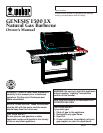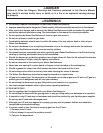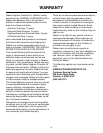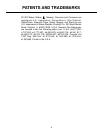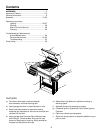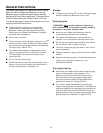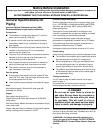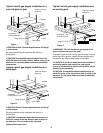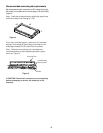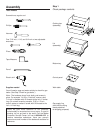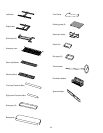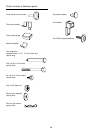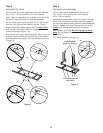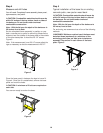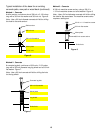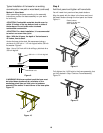Special offers from our partners!

Find Replacement BBQ Parts for 20,308 Models. Repair your BBQ today.

Buy Weber Grill Parts. It couldn't be easier. Find your Weber parts here.

7
General Specifications for
Piping
American National Standards Institute (ANSI)
Recommendations for gas supply installations:
Connections:
■ This barbecue is designed to operate at 7 inches of
water column pressure (.2526 psi).
■ A manual shut-off valve must be installed outdoors,
immediately ahead of any connections or change in
pipe material.
■ An additional manual shut-off valve indoors should be
installed in the branch fuel line in an accessible
location near the supply line.
■ The point of tie into the branch line should be carefully
selected to avoid a drip leg or be downstream of a
valve controlling another appliance.
■ Pipe compound should be used which is resistant to
action of natural gas when connections are made.
■ The outdoor connector must be firmly attached to
rigid, permanent construction.
Gas line piping
■ If the length of line required does not exceed 50 feet,
use a 5/8" O.D. tube. One size larger should be used
for lengths greater than 50 feet.
■ Indoor and above ground piping can be steel or copper.
Steel
New standard weight (Schedule 40) steel pipe with
malleable iron fittings.
Copper
New copper tubing type K or L.
Copper tubing must meet requirements of ASTM B88
latest edition.
Use flared fittings. Metallic ball sleeve compression fittings
must not be used.
Copper tube joints may be soldered or brazed with material
having a melting point in excess of 1,000°F.
Outside underground piping
Outside underground piping may be copper tubing, type
K or L (ASTM B88) or polyethylene plastic tube PE3306
(Minimum wall thickness .062") meeting ASTM 2513,
latest specifications.
Steel pipe is not recommended for underground use
unless it is protected with an approved coating, insulated
from hose piping and cathodically protected.
It is recommended that copper tubing be corrosion
protected with a satisfactory material such as TC Mastic.
All buried fittings should be corrosion protected with a
satisfactory material such as TC Mastic.
Underground piping must have a minimum of 10" cover.
Plastic tubing
Plastic tubing is suitable only for outside underground use.
■ The transition from metallic pipe to plastic pipe should
be made outside and at least 10" underground.
■ When compression or crimp type mechanical joints
are used with plastic pipe, it is advisable to use an
internal rigid stiffener in conjunction with the fitting.
■ The stiffener should be assembled flush with the end
of the tube and extend at least to the outside edge of
the compression fitting.
Testing connections
You will need a soap and water solution and a rag or
brush to apply it.
All connections and joints must be thoroughly tested for
leaks after gas has been turned into the line.
Notice Before Installation
Contact your local municipality for any building codes regulating outdoor barbecue installations. In absence of
local codes, you must conform to the latest edition of ANSI Z223.1.
WE RECOMMEND THAT THIS INSTALLATION BE DONE BY A PROFESSIONAL.
ƽ DANGER
Do not use an open flame to check for
gas leaks. Be sure there are no sparks or
open flames in the area while you check
for gas leaks. This will result in a fire or
explosion which can cause serious bodily
injury or death, and damage to property.
Wet the fitting with a soap and water solution. Any bubbles
that form or grow indicate a leak. If bubbles occur shut off
gas, tighten the fitting, and retest.
ƽWARNING: If a leak persists after tightening the
fitting, turn gas off at the supply. DO NOT OPERATE
YOUR BARBECUE. Contact Weber-Stephen Customer
Service.



